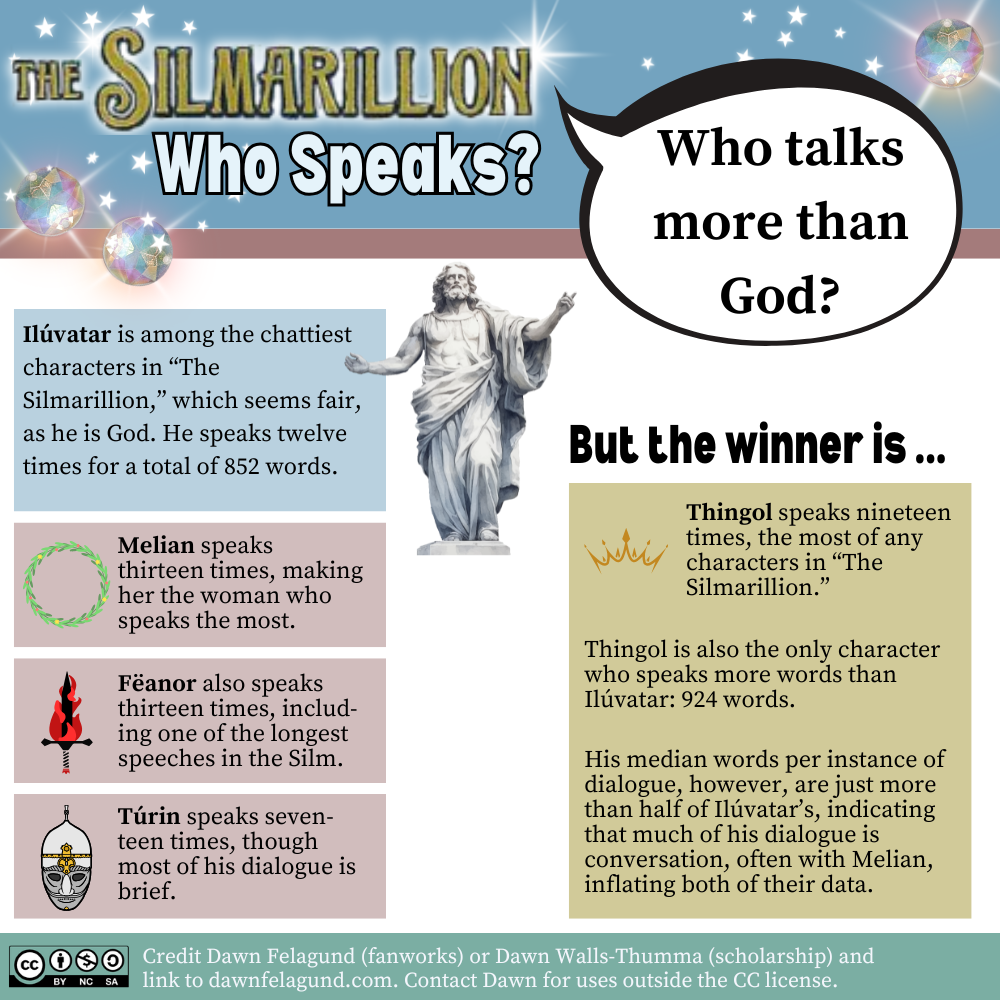New Challenge: Musicals
Prompts this month come from musicals.
The Silmarillion: Who Speaks? by Dawn Felagund
Who Talks More Than God?

The last couple of days have been heavier topics, with data on who speaks by gender and character group, so today seemed a good day for a post that is only semi-serious!
Because it doesn't actually mean much to talk more than Ilúvatar in The Silmarillion. Ilúvatar has a lot of lines and is prone to speech-making so has a high word count as well, but it's not like the four characters who speak more than him are trying to one-up God or anything. But we're Silmarillion fans and anything related to our characters feels political, so it's fun to consider which of them talk more than God.
In fact, the four characters who do are interesting in part because their dialogue is so different. Melian's dialogue is mostly in conversation, with Thingol or Galadriel. Fëanor has a variety of different dialogue but also makes some lengthy speeches; his speech to the Noldor prior to their exile is the third longest in the book (excluding two instances of "group speeches"). Túrin is the exact opposite: He speaks a lot, but his instances of dialogue are unusually short. The median length of an instance of dialogue across the book is thirty-one words, but the median for Túrin's dialogue is twenty-one words.
Thingol, of course, comes out on top as the character who speaks the most instances of dialogue AND the most words, topping Ilúvatar in both of these categories.
Returning to Melian and continuing yesterday's discussion of gender and speech, the woman who speaks the most after Melian is Yavanna, with ten instances of dialogue (most of them in the Christopher Tolkien-authored "Of Aulë and Yavanna). This means that Melian and Yavanna speak more than half of the dialogue uttered by women in The Silmarillion.
Of course, I'm always interested in pseudohistorical readings of The Silmarillion, particularly thinking about who is telling the story at what points and how the story Tolkien gives us is shaped by narrative point of view.
In this case, Thingol as the top talker makes sense given that the Beleriandic materials were collected by Pengolodh, who counted as a major source the refugees from Doriath who migrated, as did he, to Sirion's mouth. Dírhaval, who is credited with Túrin's story, would have likewise heard much of Thingol (and Melian) from his sources. It makes sense that Thingol, Túrin, and Melian are written with more immediacy than other characters are, who likely felt less accessible to the narrators.
What about Fëanor? The Aman materials were authored by Rúmil and passed to Pengolodh. I've always felt like Rúmil's sections portray Fëanor with more humanity than Pengolodh's sections do, though I've not yet drilled down into the data on this. The dialogue data seems to support that, at least, Rúmil perceived Fëanor as a character important enough that his words were worth preserving. That may seem like a "doh" statement, but consider how many important moments throughout The Silmarillion occur without us hearing dialogue from anyone at all. Multiple of Fëanor's speeches, on the other hand, were preserved.

